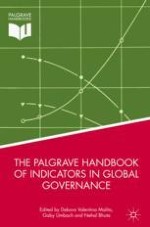
2018 | OriginalPaper | Chapter
1. Introduction: Of Numbers and Narratives—Indicators in Global Governance and the Rise of a Reflexive Indicator Culture
Authors : Nehal Bhuta, Debora Valentina Malito, Gaby Umbach
Published in: The Palgrave Handbook of Indicators in Global Governance
Publisher: Springer International Publishing
Activate our intelligent search to find suitable subject content or patents.
Select sections of text to find matching patents with Artificial Intelligence. powered by
Select sections of text to find additional relevant content using AI-assisted search. powered by